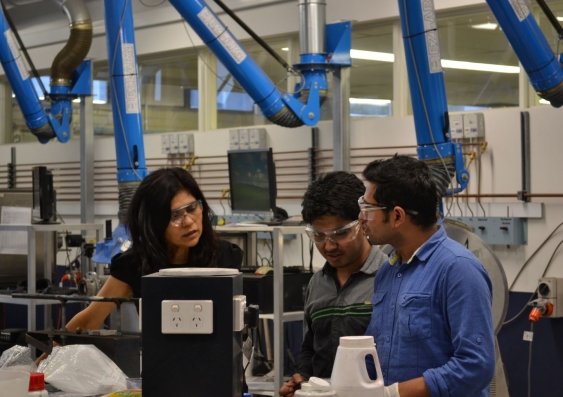єЪБПНшґуКВјЗ program fast-tracks green tech from lab to market
2025-05-28T09:00:00+10:00

єЪБПНшґуКВјЗ's Technology Translation Squad: Mr Peter McNair, Dr Matthew Priestley and Dr Thomas McNeill. The team is providing green tech startups with deep electrical engineering expertise to remove barriers to product commercialisation.
Photo: єЪБПНшґуКВјЗ Sydney
The Technology Translation Squad provides critical engineering support to green tech startups to help them commercialise their products sooner.
Australian universities have long been home to world-leading researchers making ground-breaking discoveries. While universities excel at fundamental and applied research, they’re not typically recognised for late-stage product development.В But now, a team of engineers at єЪБПНшґуКВјЗ Sydney is looking to change this, with an Australian-first program bridging the gap between the lab and commercialisation.
єЪБПНшґуКВјЗ has established Australia’s first university-based service to provide rapid technical expertise to help businesses solve electrical engineering problems quickly, particularly in the late stages of product development. The program is supported by the federal government’s (TRaCE).
“Australia’s decarbonisation goals present a wealth of opportunities for small-to-medium enterprises (SMEs), startups and established industry players seeking to develop new technologies, innovative products or services that facilitate electrification,” said Professor John Fletcher, research theme lead for TRaCE Electrification, Energy Systems and Storage.В В
“We provide our technical knowledge to help these businesses to keep pace with evolving markets and commercialise their technology.”
Prof. Fletcher and Lead Technology Translator Dr Matthew Priestly established the Technology Translation Squad (TTS), based on a highly successful program Prof. Fletcher and colleagues developed when working at the University of Strathclyde in Scotland. There, they built a national network of researchers providing rapid, low-bureaucracy support for technical challenges, making university expertise more accessible and responsive to real-world needs.
Addressing businesses’ technical hurdles with deep academic expertise
At єЪБПНшґуКВјЗ, eligible applicants can access up to five free days of specialised support from the TTS. If more help is needed, there’s an option to continue through a paid engagement or by accessing other support programs.
Dr Priestley said Australia had a massive skills shortage in the electrical engineering field, as the demand for electrification outstripped supply.В
“The work required to meet net zero by 2050 is predominantly in electrification, and of course that requires a lot of electrical engineers,” Dr Priestly said. “Our manufacturing sector – particularly in electrical engineering products – is very limited, which means we don’t have enough deep technical expertise here.
“If an SME or a startup has an interesting challenge that needs support, the only option has been to go to one of the big consultancy companies, which can be prohibitively expensive for these young companies.”В
He said єЪБПНшґуКВјЗ’s TTS was unlike a consultancy firm that only took on projects with financial value.
“We generally try to take on work that shows high potential to have a positive impact on Australia, our industry partner and the University. We are almost entirely impact focussed.”
Energy storage startup signs $2.2m deal with TTS
Energy storage startup Green Gravity has already seen significant value from engaging єЪБПНшґуКВјЗ’s TTS.
The NSW-based company has developed a gravity-based system for long-duration energy storage. The system stores excess renewable energy when there is an oversupply in the electricity grid by lifting heavy weights. When electricity is required, the weights are lowered, using gravity to drive a regenerative motor and produce energy.
Following an initial collaboration, the teams have determined a clear path to market and they are now pursuing a larger R&D project under the TRaCE program, with a $2.2 million deal announced today.
“Working with єЪБПНшґуКВјЗ gives us access to deep technical expertise, particularly in power systems and grid integration,” said Mark Swinnerton, Founder and CEO of Green Gravity.
“Our collaboration brings together industry knowledge and academic research to ensure our technology is efficient, safe and ready for commercial deployment.” В
A unique advantage of Green Gravity’s approach is its use of existing vertical mine shafts – a resource that is abundant across Australia, with more than 80,000 legacy mining sites. By repurposing these shafts, the technology minimises the need for new construction, reduces costs, and contributes gives new purpose to underutilised industrial infrastructure.
The TTS and Green Gravity will work together to design and optimise the key electrical systems that underpin the storage system. This includes analysing and designing the system’s power conversion and controls to support efficient deployment, long-term operation and integration with the grid. The goal is to ensure the technology meets the highest regulatory, safety and performance standards – paving the way for commercialisation and large-scale adoption.В В
Our collaboration brings together industry knowledge and academic research to ensure our technology is efficient, safe and ready for commercial deployment.
Prof. Fletcher said this powerful combination of private sector innovation and academic research exemplified how targeted research and development support could accelerate the commercialisation of high-impact technologies.
“Our model makes university expertise more accessible and responsive to real-world needs. In doing so, the TTS not only enhances the reputation of universities among Australian businesses – especially in the high-demand fields of decarbonisation and electrification – but also ensures academic knowledge is translated into practical, impactful solutions.”
Media enquiries
For media enquiries and to arrange interviews, please contactВ Louise Templeton:
Tel: +61 413 495 994
Email: Louise.Templeton@unsw.edu.au


.jpg)




